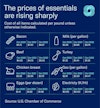When the Administration or others suggest inflation is happening because businesses are price gouging, they are ignoring the hard and fast laws of supply and demand in a free enterprise system as well as how federal policies impact the economy.
Why Inflation is Rising: Prices are rising for a variety of reasons, including the supply chain bottlenecks, workforce shortages, and excessive fiscal stimulus. Supply chain issues and the worker shortage are raising input costs for businesses. At the same time, fiscal stimulus from the various COVID packages has left Americans sitting on nearly $3 trillion of excess savings over and above the pre-COVID baseline, which is fueling increased demand.
More money chasing fewer goods is always a recipe for inflation.
Reconciliation Bill Will Further Fuel Inflation: Policymakers could make matters even worse by, for example, enacting the so-called “Build Back Better” bill. Over the next year plus, the reconciliation bill will increase inflationary pressures because of its deficit financed spending, transfer payments and tax cuts.
- According to the non-partisan Congressional Budget Office, over the next five years, the bill will increase the deficit by nearly $800 billion. This will fuel greater consumption, pushing inflation even higher.

- This understates the inflationary impact given that the bill includes at least $153 billion in transfer payments and tax cuts for individuals in 2022. This will fuel greater consumption, pushing inflation even higher.
- The passage of Build Back Better would raise the inflation rate from 3.8% to 4% in 2022. – Analysis by Mark Zandi , Chief Economist, Moody’s Analytics See Table 3. (Note: this likely understates the impact given that the estimate was made before the inclusion of $50 billion in additional tax cuts in 2022.)
- The Chamber calculated the potential impact of a year of 4% inflation on top of the past year’s 6.2% (assuming the composition of future inflation remains the same):

What experts are saying:
- “It will make the labor market even hotter and create even more price pressure,’’ – Ethan Harris, head of global economics research at Bank of America (Bloomberg)
- “…the House bill as currently drafted will add ~$200 billion to next year's deficit alone. I don't see how we can do that when inflation is 2-3x our target.” – Ben Ritz, Director of the Progressive Policy Institute’s Center for Funding America’s Future (Twitter)
- “Right now, anything that expands aggregate demand is not warranted, not advisable. The economy seems to be operating pretty close to its capacity constraints.” – Michael Feroli, Chief U.S. economist for JPMorgan Chase (Bloomberg)
- "[Build Back Better] is more likely a small positive for inflation in 2022.” – Jason Furman, CEA Chair under President Obama (New York Times)
- Regarding BBB: “On net, I expect inflationary pressures. Why? a) $200 billion/year of upfront borrowing - spending comes way in advance of offsets; b) offsets won't temper demand much - taxes on corporations and those w/ $25m+ of income won't change consumption much; c) slow supply policies.” - Marc Goldwein, Head of Policy, Center for Responsible Federal Budget (Twitter)
- According to The Dispatch, even some of the Nobel economists who signed an earlier letter talking about how “Build Back Better” will ease inflationary pressures, admit that is over the long-term, not necessarily the short-term:
The key takeaway: This is Economics 101. The Administration knows this, and they shouldn’t get away with blaming businesses when inflation is driven by a confluence of market factors, and they should not be fueling further inflation with more government spending.
About the authors

Curtis Dubay
Curtis Dubay is Chief Economist, Economic Policy Division at the U.S. Chamber of Commerce. He heads the Chamber’s research on the U.S. and global economies.





